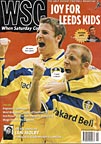 After much publicity, the Football Task Force released its final report. Roger Titford finds out if it will make any difference to English football and its fans
After much publicity, the Football Task Force released its final report. Roger Titford finds out if it will make any difference to English football and its fans
The final report from the Football Task Force appeared just before Christmas. If it were a match it would be a 0-0 stalemate and a sadly predictable one too. This was a big opportunity for fans and authorities to move closer together. In the event, each side issued separate and contradictory reports on how the game should, or should not, be regulated and passed the buck to Kate Hoey, the sports minister, who now has the tough choice of being radical or practical.
The majority report, based on the desires of supporters’ groups, contained a mish-mash of strategic goals and tactical point-scoring. “What we would like to see next year is less airy-fairy talk about £4 million sports centres and more concrete means whereby supporters can have can have a direct say in the affairs of the club.” This is not a quote from the Task Force report but from a review of the 1972-73 season in the pioneering fan magazine Foul. Yet we do not seem to have moved on very far. There is a certain time-warp quality to some of the recommendations, such as: “Clubs should be encouraged to have fans on the board.” This also featured in the 1968 Chester Report. By contrast, little or no emphasis is given to the way in which developments in policing, TV and European competition are mangling the traditional football calendar.
Still, at least the two sides have got together in the same room and produced the Independent Scrutiny Panel. Come what may, the FA say they will go ahead with the ISP in 2001 and it will offer a readily identifiable procedure for fans to complain about the commercial actions of clubs and football authorities. This is the first time the game has accepted the idea of outside monitoring.
Critics will say it amounts to little more than a glorified Pools Panel; four or five government appointees meeting on a part-time basis for only four weeks a year and having no sanctions, other than public embarrassment, over erring clubs. The majority report calls for a much more substantial and more pro-active regulator, a Football Audit Commission or “Ombudsfan”, who would set down and enforce rules on matters such as ticket allocation and pricing, consultation, even the shelf-life of club merchandise. The clubs have basically said no to that. Or, less precisely: “We must be free to balance all areas of interest, including shareholding and TV revenue.”
At the heart of this impasse is the philosophical divide between the fans’ view of the game as a sport and the clubs’ view of the game as a business. For the most part fans want to see clubs competing on the pitch and nowhere else. But clubs have begun to see themselves as competitive businesses: is there a Man Utd store in your town? Some, as plcs, now have primary duties to institutional shareholders rather than the fans, the local community or the game as a whole. Without resolving the fundamental question of “what are professional clubs now for?” the Task Force was bound to run into insoluble disagreement.
Supporters’ groups may well have guessed that would be the case and chosen to spread their fire around. There is no other excuse for mixing such thoroughly high-level strategic arguments about how clubs are owned with low-level concerns about sell-by dates on replica shirts.
It is now down to the government alone to decide whether football is a special kind of “community” business that merits overt regulation to protect its irrational consumers from the demands of its suppliers or whether it is just another part of the unregulated entertainment business.
From WSC 156 February 2000. What was happening this month